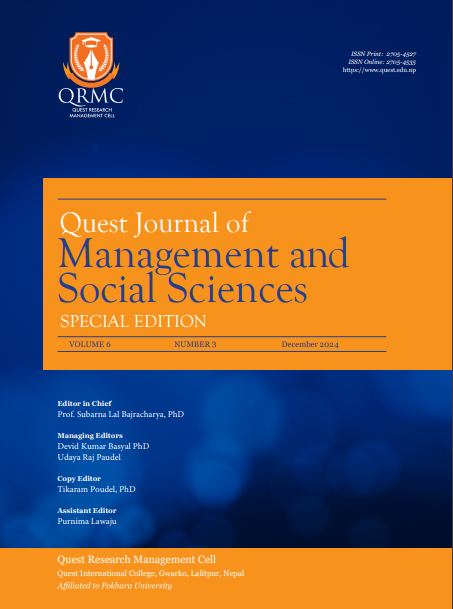Impact of AI in Education: An Evidence from Use of ChatGPT in Management Education in Nepal
DOI:
https://doi.org/10.3126/qjmss.v6i3.72875Keywords:
Technology Acceptance Theory, ChatGPT, management education, Structural Equation ModelingAbstract
Purpose: The purpose of the study is to examine the impacts of ChatGPT in management education in the Nepalese educational landscape.
Methods: An explanatory research design was used in this study. Four hundred-three respondents were taken as a sample using the convenience sampling method. Technology Acceptance Theory is used. Descriptive and inferential statistics were used to examine the data. SEM was used to analyse the data.
Findings: The results show that perceived ease of use, usefulness, and attitude significantly affect behavioural intention. Accuracy and reliability, data privacy, and security are significant challenges faced by the user, and the managerial solution for reducing these challenges is to follow proper rules and regulations, as well as safety and security measures.
Conclusions: This study concludes that behavioural intention towards ChatGPT is affected by perceived ease of use, usefulness, and attitude.
Implications: This analysis and findings will help the Ministry of Communication and Information Technology, an educational institution, IT agencies, the government, researchers in similar fields, professionals, and future students.
Originality: This research is original, and there is no knowledge conflict.
Keywords: Technology Acceptance Theory, ChatGPT, management education, Structural Equation Modeling
Downloads
Downloads
Published
How to Cite
Issue
Section
License
Copyright (c) 2024 Quest Journal of Management and Social Sciences

This work is licensed under a Creative Commons Attribution-NonCommercial-NoDerivatives 4.0 International License.
This license enables reusers to copy and distribute the material in any medium or format in unadapted form only, for noncommercial purposes only, and only so long as attribution is given to the creator.




